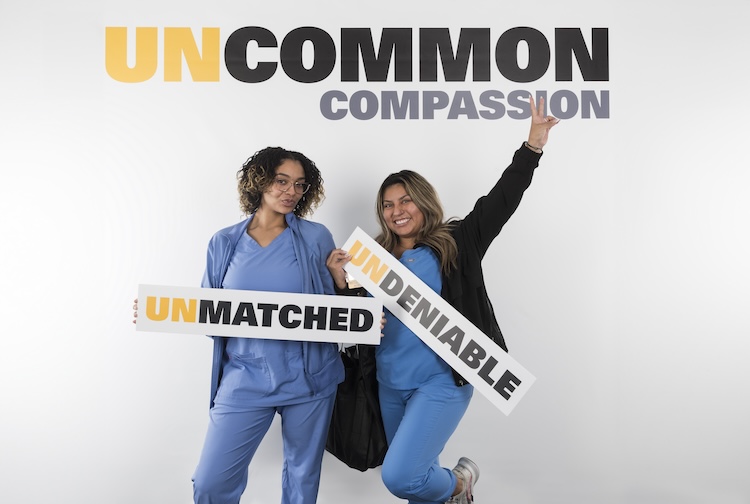
Reducing health inequities for Black pregnant people
A VCU Health OB-GYN shares the questions and concerns she hears from Black patients, including their 'fear of becoming a maternal mortality statistic.’
April 11, 2024 A VCU Health OB-GYN says the foremost concern she hears among Black pregnant individuals is the fear of becoming a maternal mortality statistic. (Getty Images)
A VCU Health OB-GYN says the foremost concern she hears among Black pregnant individuals is the fear of becoming a maternal mortality statistic. (Getty Images)
By Debbie Schumacher
According to the Centers for Disease Control and Prevention, Black women in the United States are three times more likely to die from a pregnancy-related cause than white women.
This heightened risk spans all income and educational levels. The leading causes of death in Black women during pregnancy or after childbirth include complications related to cardiovascular disease and preeclampsia, which is a specific type of high blood pressure that happens mostly in the third trimester of pregnancy.
“Contributing factors include the quality of health care, underlying chronic conditions, structural racism and implicit bias,” said Tashima Lambert Giles, M.D., obstetrician and gynecologist at VCU Health. “The good news is that there are some positive initiatives and programs happening at the national, state and Richmond level.”
Every year, Black Maternal Health week takes place from April 11 to 17 to bring awareness to this disparity and amplify the voices and experiences of Black mothers. On the Healthy with VCU Health podcast, Lambert Giles discusses the importance of Black maternal health and what VCU Health and its patients can do to improve outcomes.
What are some of the specific concerns or questions that Black pregnant people ask you?
The foremost concern among Black pregnant individuals is the fear of becoming a maternal mortality statistic. They seek reassurance about their safety during pregnancy, childbirth and postpartum. Open communication and continuity of care are essential in addressing these concerns.
The second concern among many Black women is how they can best prepare themselves for pregnancy. Knowing and sharing one’s family history and any conditions, such as high blood pressure, diabetes or problems with weight management, allows us to work together to maintain optimal health throughout the process. Preparation and collaboration are key to improving pregnancy outcomes.
What are some of the initiatives VCU Health’s Department of Obstetrics and Gynecology (OB-GYN) is doing to reduce health inequities?
VCU Health prioritizes equitable access to safe, quality care for all patients, regardless of race or socioeconomic status. We work to create an environment that is safe, culturally competent and supportive, regardless of the color of a patient’s skin.
Initiatives include evaluating care practices for potential biases and providing implicit bias training. All of us - providers, nurses, team members - who interact with patients recognize that we may bring bias to a situation, and we need to learn ways to reduce this bias so it doesn't impact our care.
It’s important that our workforce reflects the patients that we care for; diversity in providers can improve patient outcomes. Patients feel more comfortable and trusting with providers with similar racial or cultural backgrounds and may be more willing to accept recommendations.
We also work with local health departments and community partners, such as Urban Baby Beginnings, to develop programs that help address social needs for patients, such as housing, transportation, and provide additional maternal support with doula services. Offering services like this helps decrease inequities in maternal health outcomes.
One in five women experience postpartum depression, with Black women being at greater risk. What's being done at VCU Health to help the mental health of mothers?
Anxiety and depression screening is conducted for all patients during prenatal and postpartum appointments at VCU Health. Depending on screening results, individuals may be referred to a social care worker or psychiatrist for further support.
This is a research interest of mine. We are currently getting approval to begin a postpartum depression research project that is geared towards minorities to see whether the current screening guidelines identify depression accurately for women of color, given that they may not use the same words to describe depression.
We offer free postpartum in person and virtual support groups to help individuals navigate the challenges of postpartum mental health. Registration is required for Getting Better Together: Postpartum Support Group for Moms.
How can Black women advocate for themselves and ensure they receive optimal care?
Your pregnancy and birth journey should be one of joy, despite the statistics and disparities. Find supportive OB-GYN providers who understand your unique needs and provide culturally competent care. Our job as providers is to make sure that you have a clear understanding of what is happening in your body. When you come here, you should feel educated, empowered and comfortable with your care.
The best outcomes in pregnancy occur when you’re in the best health prior to pregnancy. Prioritize your health before pregnancy, including addressing risk factors such as weight and chronic conditions. And try to plan when to become pregnant so you are ready.
Come to your appointments with questions and seek clarification when needed to ensure you understand your care plan. We want you to leave with a clear understanding of our recommendations.
Advocacy for oneself during appointments and open communication are also important to ensure optimal care. This is encouraged for all patients.
Black maternal health is so important to not just Black women - it's important to all of us. Healthier Black women and a healthier Black community impacts our entire community.



